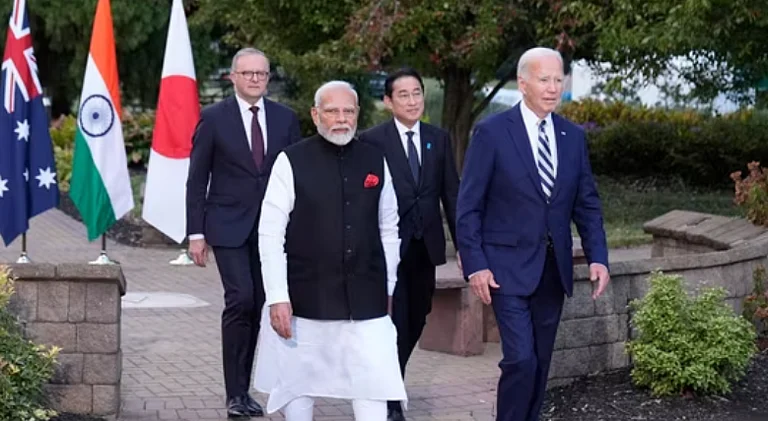India signed multiple agreements focused on promoting a clean economy, a fair economy, and global prosperity in Delaware, USA on Saturday. This event occurred during Prime Minister Narendra Modi's three-day visit to the United States for the Quad Summit, as confirmed by the commerce ministry in a statement on Sunday.
India Signs Three IPEF Agreements During PM Modi’s US Visit. Details Inside
During Prime Minister Narendra Modi's visit to the US, India signed three important agreements under the Indo-Pacific Economic Framework (IPEF) in Delaware. These agreements focus on promoting a clean economy, a fair economy, and enhancing global prosperity.
Earlier this month, the Union Cabinet, chaired by PM Modi, granted approval for the signing and ratification of these agreements. Although the agreements were initially established during the IPEF Ministerial meeting in Singapore on June 6, 2024, India held off on signing at that time due to pending domestic approvals.
Launched on May 23, 2022, in Tokyo, the Indo-Pacific Economic Framework (IPEF) aims to strengthen economic cooperation among partner countries to promote growth, stability, and prosperity in the region. The framework is built around four key pillars: trade (Pillar I), supply chain resilience (Pillar II), clean economy (Pillar III), and fair economy (Pillar IV). India ratified the supply chain resilience agreement in February 2024 and has maintained an observer status in the trade pillar.
The newly signed Agreement on Clean Economy is designed to enhance technical cooperation, workforce development, and research collaborations among IPEF partners. It aims to facilitate the development and deployment of clean energy and climate-friendly technologies, ultimately helping to accelerate collective efforts toward energy security, climate resilience, and greenhouse gas emissions reduction. This agreement will promote investments and project financing, particularly benefiting small and medium enterprises (MSMEs) in India, while also integrating Indian companies into global value chains.
An overarching agreement was also signed, establishing a high-level political oversight framework at the ministerial level for the various IPEF agreements. This administrative agreement aims to provide guidance and set goals for the IPEF partnership, ensuring effective implementation of individual agreements, particularly those related to clean and fair economies. It is expected to create a formal mechanism for ministerial discussions on emerging issues, thereby enhancing the longevity and identity of the IPEF partnership.
Under the Clean Economy Agreement (Pillar III), IPEF partners will focus on attracting investment in green technology and reducing greenhouse gas emissions through various initiatives. For instance, the first Investor Forum held in Singapore in June 2024 identified USD 23 billion in priority infrastructure projects, with India contributing USD 4 billion aimed at renewable energy investments. Notably, Singapore-based Sembcorp plans to invest ₹36,238 crore in a state-of-the-art green ammonia plant in Thoothukudi, following a memorandum of understanding among companies from India, Singapore, and Japan.
The IPEF provides platforms for technical assistance, concessional funding, and viability gap funding. The IPEF Catalytic Capital Fund, which received an initial grant of USD 33 million from Australia, Japan, Korea, and the United States, aims to catalyze private investments totaling USD 3.3 billion. Additionally, the PGI Investment Accelerator has secured initial funding of USD 300 million from the U.S. International Development Finance Corporation (DFC).
In terms of workforce development, the IPEF has launched an upskilling initiative to support sustainable economic growth. This program primarily targets women and girls in emerging and middle-income partner countries, providing access to digital skills training. Over the past two years, 14 U.S. companies and the Asia Foundation have provided 10.9 million upskilling opportunities across IPEF partners, with India benefiting from 4 million of these opportunities.
The IPEF is also actively engaged in critical mineral dialogue, focusing on mapping mineral resources, promoting trade within the region, and enhancing technical collaboration for mineral recovery and recycling. These initiatives aim to strengthen the critical mineral supply chain and ensure sustainable mining practices.
Another important feature of the IPEF is the Tech Council, which facilitates coordination and cooperation on key technologies among member countries. Current collaboration areas include cybersecurity, undersea cables, and artificial intelligence.

